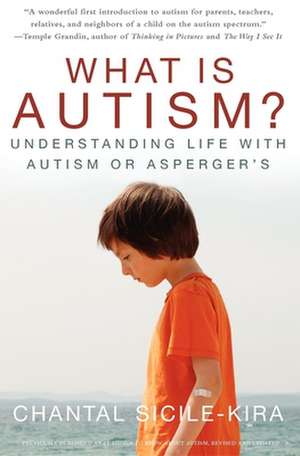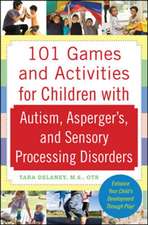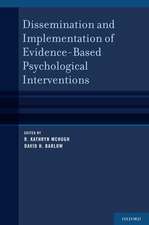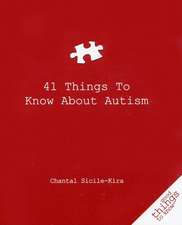What Is Autism?: Understanding Life with Autism or Asperger's
Autor Chantal Sicile-Kiraen Limba Engleză Hardback – 31 mar 2012
International autism advocate and bestselling author Chantal Sicile-Kira provides this simple, concise explanation of one of the most prevalent disorders in America.
Each year, 1 in every 100 children in America are diagnosed with autism. Although autism has reached epidemic proportions, it is far from understood. In What Is Autism? Chantal Sicile-Kira provides a clear, instructive explanation of autism spectrum disorders and what life is like for those on the spectrum. If you know someone with autism and would benefit from a quick, straightforward explanation of the condition, this book is the perfect resource. What Is Autism? explores in a simple question-answer format topics such as:
What are the causes of autism? Can vaccines cause autism?
Can autism be prevented?
How can I recognize the symptoms?
Why do children and teens with autism act the way they do?
What are the emotional effects of autism on the family? Citește tot Restrânge
| Toate formatele și edițiile | Preț | Express |
|---|---|---|
| Paperback (1) | 89.68 lei 22-36 zile | |
| Turner – 31 mar 2012 | 89.68 lei 22-36 zile | |
| Hardback (1) | 144.75 lei 22-36 zile | |
| Turner – 31 mar 2012 | 144.75 lei 22-36 zile |
Preț: 144.75 lei
Nou
27.70€ • 28.100$ • 22.92£
Carte disponibilă
Livrare economică 17-31 martie
Specificații
ISBN-10: 1630264822
Pagini: 174
Dimensiuni: 140 x 216 x 14 mm
Greutate: 0.37 kg
Editura: Turner
Cuprins
Introduction xiii What is autism, and why is it called a spectrum disorder? 1 Is there really more autism now? 3 Do vaccines cause autism? If not, what does? 7 What are the diagnostic criteria for autism spectrum disorders? 11 What is sensory processing disorder, and how is it related to autism? 15 I think my child has an autism spectrum disorder. What can I do? 19 I think I have Asperger's syndrome. What should I do? 23 My child has just been diagnosed with autism. How do I cope? 27 What do I do after the diagnosis? 31 Can autism be cured? Does everyone think it should be? 35 What are the treatments and therapies for autism? 37 What can be done to help with sensory processing challenges? 41 How do I make sure my child gets a good education? 45 How do I determine my child's educational needs? 49 Why is it hard to know how much they understand? How can we gain a better picture of the child? 53 How can their special interests or obsessions help them to learn? 57 Why do children, teens, and adults act the way they do? 61 Self-stimulatory behavior: What is it, and what is its purpose? 65 What are the emotional and financial effects of autism on the family? 69 What are the effects of autism on the siblings? 75 Why are holidays difficult for families with autism? 79 I am the grandparent of a child with autism. What can I do to help? 83 A friend or relative I know has a child with autism. What can I do? 87 I'm a neighbor or community member. How should I react to or approach someone with autism? 91 Do those on the spectrum want friends? If so, why is it so difficult for them to make friends? 93 What are the safety concerns for someone on the autism spectrum? 97 What communication difficulties do they have? 103 Why are transitions from one place to another, or one activity to another, problematic? 109 How can we teach the concept of private and public behavior? 113 How can we teach them to be more independent, but also teach them interdependence? 115 How can we teach them self-regulation? 119 Why don't they look me in the eye? 123 Why are emotions hard for them to understand? 125 How can we teach them self-esteem and self-advocacy? 127 What are the thirteen things to know about raising and educating a teenager on the spectrum? 131 Why do preteens and teens have a hard time with the body changes that puberty brings? 135 Why does it seem like their autism is getting worse at puberty? 137 Are adults on the spectrum interested in long-term relationships, marriage, and sex? 141 What is college like for young adults on the spectrum? 145 Why is it so hard for adults with autism to find and keep a job? 149 What hope is there for the future for people on the autism spectrum? 155
Recenzii
“An incredible resource for family members, professionals and individuals on the spectrum attempting to better inform the public about various aspects of ASD.” —Dr. Cathy Pratt, Chair, Autism Society of America and Director, Indiana Resource Center for Autism
“In her crisp and authentic voice, Chantal provides a work that broadens the understanding and offers many answers to the most perplexing problems. Well done!” —Edmund C. Arranga, Co-founder & Executive Director, AutismOne
“[Chantal’s] work cuts to the heart of the matter. She approaches the subject by acknowledging its immensity and its baffling characteristics. Yet by sticking to a doctrine of clarity and pragmatism, she also enlightens.” —Douglas Kennedy, author of Leaving the World and The Job
Notă biografică
Extras
Autism is a word we are hearing more and more every day in the media, but to those who are neither parents nor educators of children with autism, the condition is still a big mystery. As an autism expert who travels around the country to provide training, I get asked a lot of questions by parents and teachers at the seminars I give. But many more questions are asked by people I meet in planes, at the grocery store, in the waiting room at the doctor’s, and by those who have a neighbor, family member, or friend whose life is touched by autism, and who want to know more. Several common questions they have asked me include:
“Do vaccines cause autism?”
“Why does my neighbor’s kid always carry a red plastic snake?”
“Why don’t they look me in the eye?”
“I’m a grandparent; what can I do to help?”
“I think my child has an autism spectrum disorder. What can I do?”
Many parents of autistic children have told me they wished there was a quick read to give to people they know—the child’s grandparents, neighbors, and general education teachers—so that they could have a better understanding of what they and their child are going through. I wrote this book for them and for others, perhaps those who hear about autism in the media, who want answers just to better understand their fellow community members impacted by autism.
This book was also written for parents who suspect their child has autism. These pages provide a quick overview to allay their fears or point them in the right direction to get a diagnosis, and, if their child is diagnosed with autism, help get them started on the first steps of their journey.
Descriere
Sicile-Kira provides a clear, instructive explanation of autism spectrum disorders and what life is like for those on the spectrum. It explores in a simple question-answer format topics such as causes, autism, and symptoms.














